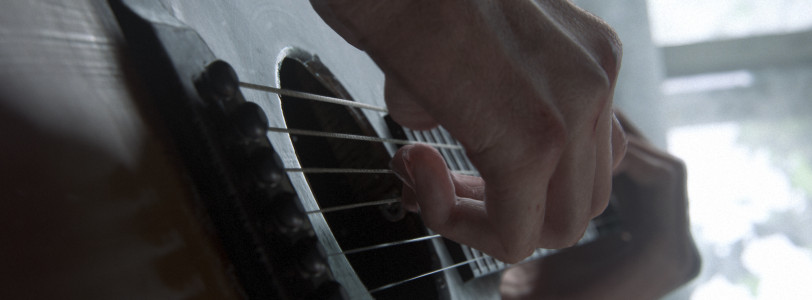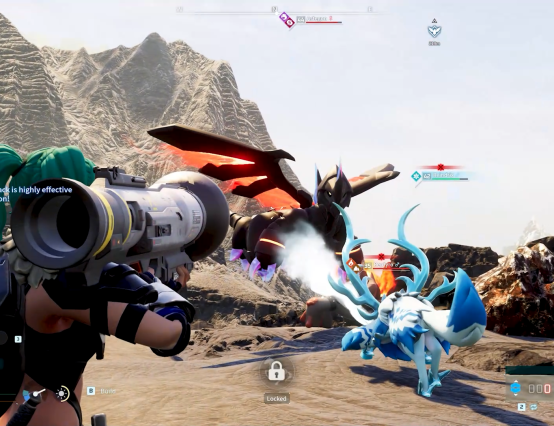SPOILERS! Oh so many spoilers! This article will address the ending of The Last of Us 2, and with so much of the game’s attraction centering on its plot I would highly recommend coming back to this article at a later date if you are planning on playing this game.
So the final scene of The Last of Us Part 2 goes something like this (I wasn’t kidding about spoilers): Ellie returns to her farm having completed(?) her quest for revenge against the person who killed Joel, her adoptive father figure. She is emotionally and physically scarred from the confrontation, having lost the top two joints of the pinky and ring fingers on her left hand in the fight. She returns to find Dina – her girlfriend – and the baby they were going to raise together have left. Ellie wanders around the farmhouse dejectedly until she finds the guitar Joel had given her to teach her to play years ago. She attempts to play but finds that with her new injuries she can’t make some of the chords to play the song Joel taught her. Having lost the last thing she had of her adoptive father she leaves the guitar leant against the windowsill and wanders off back into the wilderness, truly alone. Cut to title, roll credits.
It is very clear what Neil Druckman and the team at Naughty Dog were going for here; the guitar is established early in the game as a way Joel wants to connect with Ellie, to teach her something like a father would with a daughter. The guitar comes to symbolise their relationship, and when Joel is murdered it is a way by which she can reconnect with him from beyond the grave. The first thing Joel plays to her is Future Days by Pearl Jam, a song she later tries to play when she finds a guitar in a theatre, getting two lines in before choking up with emotion – illustrating how much the song means to her, the lyrics having found new, more literal meaning in the light of Joel’s death. This is the song that she tries to play having lost everything else in her life: her friends, her love interest, her child, what little remained of her innocence and morality… and she can’t play it. Her quest for revenge has taken everything from her, even the only tie she has left to Joel, whose death was the very motivation for her revenge in the first place.
So this seems like an artful execution right? Ellie losing everything right down to her music which is her last connection to Joel, that seems like a brilliant metaphor to close the game on! Well it does, right up until you think about it closer. This is Ellie we’re talking about here, who travelled across a country and sacrificed everything to avenge Joel’s death, who gave up her chance at the closest thing to a normal life a ruined world could give her with a person who loved her. Ellie, if she is anything, is a determined woman. So the idea that she, in the middle of her despair and loss, would attempt to play the guitar again and would just give up because of her lost fingers? Putting back the guitar and symbolically leaving behind everything that she used to hold dear? It doesn’t gel.
It would be easy to say that she is given no choice, that her new disability would prevent her from ever being able to play again. That is until you realise that some of the greatest guitarists in our own world (and canonically the games’ if the presence of other real bands are anything to go by) reached the fame and success that they attained with various disabilities to their arms or hands.
Take Tommi Iommi, whose situation is remarkably close to Ellie’s own (ya know, except the whole murder part) is a good example. He lost the tips of his fingers in a machining accident in Birmingham, allegedly the day before he was about to quit his job to become the full-time lead guitarist for Black Sabbath. To help accommodate this he melted down plastic bottle tops and attached some leather strips to make himself some prosthetics so that he could continue to play for the band. The disability meant that tight guitar strings were painful on his fingers, so he down-tuned the guitar, relaxing the strings and making it easier to play on his injured fingers. This down-tuned sound would actually become a major part of the aesthetic for Black Sabbath, contributing greatly to the “heavy” industrial sounds for which they became known, and laying much of the aesthetic groundwork for the Metal genre for years to come.
Then there is Joni Mitchell, whose run in with polio aged 9 severely affected her ability to use her left hand. You’ll find that much of her compositional style uses progressions of open chords that wouldn’t normally be used in traditional guitar writing, and whilst some of this is no doubt Joni’s own creative choice, it is also generally accepted that part of this idea is to make playing the chord progressions easier for Joni, keeping the hand further up the neck of the guitar and reducing the need to move back and forth excessively which might put strain on the hand.
Finally, and probably the most significant to Ellie’s newfound predicament, is the case of Django Reinhardt: a Belgian jazz guitarist that more or less defined the Gypsy Jazz and Hot Jazz genres. As an 18 year old he suffered extensive burns to the right side of his body, including two fingers on his right hand, reducing their range of movement. As a virtuoso guitarist, this would have been a crippling blow to many, but he adapted his playing style to accommodate this limitation, playing much of the faster virtuoso passages with his index and middle fingers and reserving the others to play chordal passages. You can see him using this technique in this video:
Safe to say, you can not just get good at the guitar with only two fingers on the fretboard at your disposal: you can utterly shred.
So Ellie wouldn’t even need to develop prosthetics for her fingers like Iommi did (although we see her crafting upgrades for her guns from scratch in the game so I think she could rustle up a few plastic fingertips without too much trouble). Like Joni or Django, she could adapt her playing and compositional style to adapt to her new physical limitations. She tells Dina in the game that she writes her own pieces so this would be completely in-character for her. This would also be a beautiful piece of character growth for her. A sign that although she has been cruelly severed from her connection to Joel, she can move on from her trauma and create something new and beautiful from it. It would take time and effort for her to do this, but she would slowly be able to adjust to her new life without Joel and without her lost digits.
But this is why I am writing this article; a combined frustration with two aspects of this final scene: firstly that it is horrendously out of character for Ellie to simply give up on her artistic passion and her connection to Joel simply because of a new physical hurdle, and secondly that it does a huge disservice to the disabled community.
There has been a lot of talk about representation in this game, be it the lesbian relationship between Ellie and Dina, the non-feminine appearance of Abby, the inclusion of several minority ethnic characters, or the inclusion of a trans character being exiled from an extremist cult because of their identity. A lot of the valid criticism of this game has sadly been undermined by a loud minority complaining that the game has sacrificed story for the sake of diversity (when actually the argument should be - in my opinion - that Naughty dog sacrificed characters for the sake of the story they wanted to tell, but that’s a discussion for another day).
Now I’m not saying that I think they should have included more disabled characters for the sake of representation. In a game like this – that exists outside of our free and progressive culture, where physical capacity is a direct measure of your likelihood to survive in a harsh world full of things and people that want you dead – it simply wouldn’t make sense. In fact, a number of disabled characters (to one degree or another) do appear in-game. Tommy loses an eye and Yara has to cope surviving with a newly amputated arm.
However none of these characters are truly seen to be overcoming their physical limitations.
Tommy, nor anyone around him, seems to even acknowledge his lost eye. His skill as a sniper and how this would be impacted and how he would respond to try and overcome that are not addressed. It is debatable that Yara is shown to be physically attempting to overcome the limitations that her lost arm gives her, but she is killed before that is really illustrated satisfactorily.
Then of course there is Ellie, and we see how she responds to the loss of her fingers. In the run up to this game’s release there was a lot of discussion about empowering characters, but frankly I think the game fails to empower anyone except for Abby and Lev. The message of this game had the potential to illustrate how characters facing enormous adversity – psychological and physical injury – could overcome those stresses and reassert their agency in a world that fiercely wants to tear it away from them. It had the perfect opportunity to give a message of empowerment to the disabled community in an organic, non-condescending manner. Instead, it squanders that chance because the only message the game seems to want to convey is one of misery: that life is a collection of characters whose morals only exist within their own frame of reference, that good people cannot survive in a world where conventional society collapses; a message completely at odds with the tone of the first game.
This final moment with the guitar is in many ways the final chance for the game to escape from the overwrought and clichéd narrative of “violence begets violence” and “revenge is bad” and tell a story that was more nuanced, that took advantage of the uniquely hostile setting and decided to tell a story of humankind fighting back to create something special in a bleak world. This is a story that the original The Last of Us told with such heartbreaking effect that it became one of the highest critically acclaimed narrative games of all time, and the game that personally became the point at which I realised the narrative potential of the medium, capturing my fascination to study how games tell their stories, to write articles like this. Joel and Ellie’s relationship was the golden glimmer of hope in The Last of Us’s grim setting and the first thing Part 2 does is to literally and figuratively kill it and spit on its corpse, and in the final moment where, having lost everything, Ellie has the chance to finally free herself from the cycle of pain and violence, to reconnect with that relationship and have a part of Joel live on in her music, Druckman and the team deny her and the audience that reconnection, and bleakness and misery abounds.









0 Comments